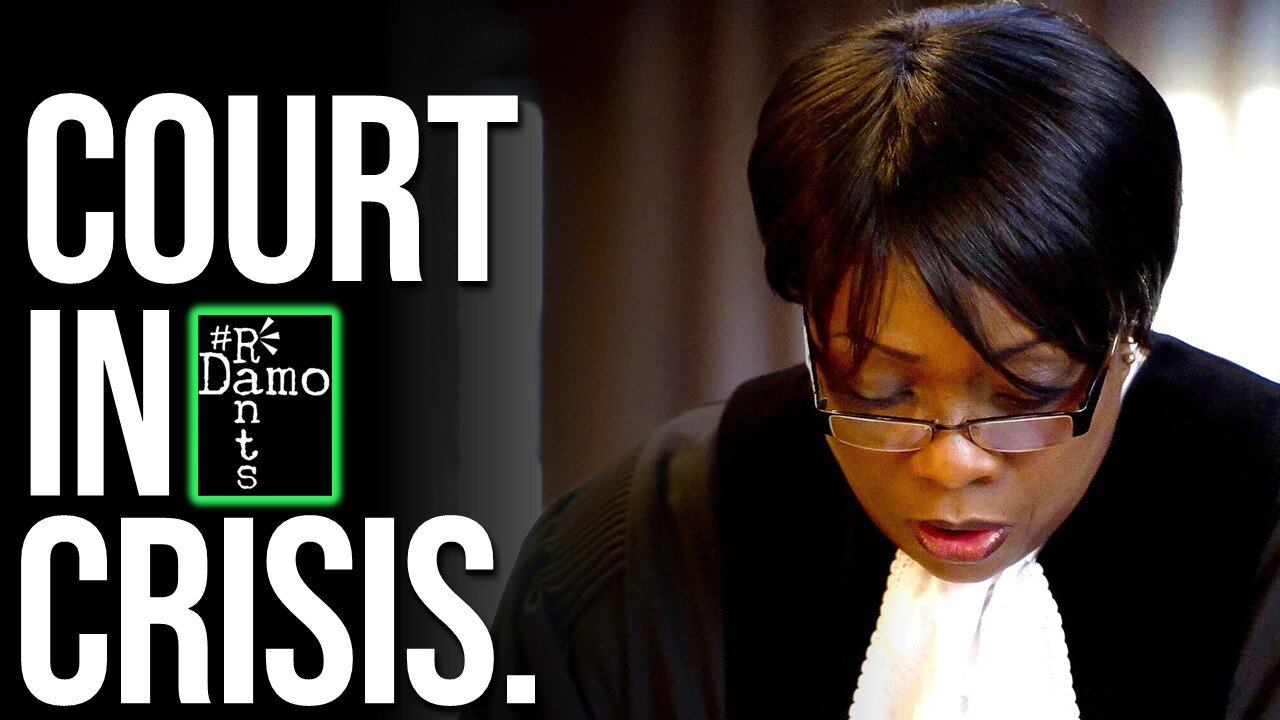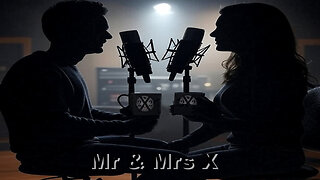Premium Only Content

ICJ Judge Chooses Israel Over Law — And the Fallout Could Be Explosive
Right, so when the vice-president of the world’s highest court starts moonlighting as a preacher of the apocalypse, something has gone badly wrong somewhere hasn’t it? Julia Sebutinde, vice-President of the International Court of Justice, draped in the robes of international law, has chosen instead to wrap herself in the Book of Revelation, declaring from her pulpit that “the Lord is counting on me to stand on the side of Israel.” One might expect this kind of sermonising from a televangelist in Texas or a YouTube prophet with a PayPal link, but not from a judge entrusted with deciding whether a state is committing genocide.
The ICJ is supposed to embody the cool detachment of law; Sebutinde instead offered the fervour of fevered prophecy. In confusing her pulpit with her bench, her faith with the law, she has managed the rare trick of weakening the institution she serves while simultaneously handing Benjamin Netanyahu the soundbite of his dreams. For the Court, her words are dynamite; for Israel, they are manna from heaven. And for those who still cling to the idea that international law might restrain power, they are a brutal reminder of how easily justice can be compromised when belief eclipses duty. The Court can take action here and it must, not just for the sake of Palestine, but for the sake of its own sanctity too.
Right, so the International Court of Justice has always been in something of a precarious position. It possesses no army, no police, no hard means of enforcement. Its power lies in its reputation as a neutral arbiter of disputes between states above all other courts and, above all, in its credibility as the world’s conscience when confronting the most serious crimes. At no point since its founding has this credibility been tested more acutely than in the current proceedings against Israel. South Africa’s case, alleging that Israel’s war in Gaza amounts to genocide, something the court has already plausibly accepted, has now also thrust the Court into the centre of the fiercest moral and political struggle of our age. It is against this backdrop that Julia Sebutinde, the Ugandan jurist who currently serves as Vice-President of the ICJ, delivered remarks that may prove devastating not only to her own reputation but to the authority of the institution itself.
On 10 August, speaking at Watoto Church in Kampala, Sebutinde proclaimed: “The Lord is counting on me to stand on the side of Israel … I want to be on the right side of history.” These words, reported by the likes of Quds News Network, Middle East Eye and 5Pillars UK, were not idle. They were delivered in a sermon to her congregation, framed in eschatological language, End of Days language as that means. They were made while she sat as vice-president of the ICJ and while Israel remained under investigation for the most serious crime in international law. They were not framed in terms of statutes, evidence, or convention. They were framed in terms of divine command.
Reactions were obviously going to be swift. Iran denounced the remarks as a “shocking breach of ethics,” pointing out the obvious contradiction between a legal mandate to impartiality and a theological mandate to stand with one party in an ongoing case. Uganda’s government, long having been embarrassed by Sebutinde, has already distanced itself from her. Its UN ambassador, Adonia Ayebare, clarified that Sebutinde’s position did not reflect that of the Ugandan state following the courts January 2024 plausiby proven case of genocide against Israel. Commentators around the world immediately recognised the danger here and now though: where her conduct in this case has been highly questionable already up until now, here was a senior judge now openly proclaiming her bias in a live case of genocide.
It is tempting to treat this as a personal failing or an unfortunate slip. Yet the deeper truth is that Sebutinde’s statement did not emerge from nowhere. It is consistent with her record on the Court, where she has been Israel’s lone defender. It is also consistent with her background as a devoted member of Watoto Church, an evangelical congregation with strong links to Christian Zionism, because Zionism and Christian Evangelism do seem to walk hand in hand far too often and it helps to trace their roots in theology, examine their impact on law, and assess the consequences for politics from that. Only then does the dual character of Sebutinde’s position emerge: she is simultaneously a threat to the ICJ’s integrity and a gift to Israel’s strategy of denial and delay.
The content of her Watoto sermon bears repeating. She told her audience that she lives in the “End Times” and that her role at the ICJ was guided by God’s will to defend Israel. This was not the language of judicial independence. It was the language of prophecy. It was a statement that she saw her role less as the impartial application of international law than as the fulfilment of a divine script. The implications are clear. If a judge is acting on God’s command, then evidence, statutes, and obligations under the Genocide Convention become secondary. Law is subordinated to theology.
The ICJ Statute could not be clearer about what is required of its judges though. Article 2 specifies that they “shall exercise their powers impartially and conscientiously.” Judges swear an oath to that effect before taking office. Impartiality is not an aspiration. It is a foundational requirement. By publicly aligning with one party on theological grounds in an ongoing case, Sebutinde did not merely cast doubt on her own impartiality. She called into question the impartiality of the institution itself. If the vice-president of the ICJ can side with Israel because “the Lord is counting on her,” why should any state trust the Court to deliver justice unswayed by ideology?
What makes the episode even more explosive is its continuity with her judicial record. In January 2024, when the ICJ issued its first set of provisional measures in South Africa v. Israel, ordering Israel to prevent genocidal acts and ensure the flow of humanitarian aid, Sebutinde was the sole dissenter to that. The order was near unanimous. Only she opposed it. When the Court reaffirmed and modified these measures in March and May, again she dissented. In July 2024, when the Court issued its Advisory Opinion declaring Israel’s occupation of Palestinian territory unlawful, she dissented once more. At the time, observers wondered why she was so consistent in opposing measures that commanded near universal agreement among her peers. With her Watoto sermon, the answer is revealed: these were not neutral legal dissents. They were theological dissents. They were dissents in fidelity to Israel’s biblical significance, not in fidelity to law.
Her background makes this even clearer. Sebutinde has long been an active member of Watoto Church in Kampala. In 2014, speaking at a Watoto event, she said: “I have the chance to practice justice at the world level because of the values I picked from Watoto Church. I am proud of Watoto.” Watoto is not an ordinary congregation. It is one of Uganda’s most prominent evangelical churches, founded by Canadian missionaries Gary and Marilyn Skinner. It is embedded in the prosperity gospel and charismatic traditions that have swept across sub-Saharan Africa, heavily influenced by American evangelicalism. Crucially, Watoto has cultivated deep ties to Israel and Christian Zionist networks.
In October 2023, Watoto Church launched a fundraising campaign explicitly for work in Israel. “What an incredible opportunity,” the church wrote on Facebook, “to participate in the extension of God’s Kingdom in Israel through our annual My Miracle Missions Offering.” The partner organisation was the Fellowship of Israel Related Ministries (FIRM). FIRM describes itself as “a global family of believers empowering local ministries to transform lives in Israel.” Its stated vision is that “every person in Israel is transformed by the love of Yeshua.” This is not neutral religious philanthropy. It is evangelical Zionism, the blending of Christian mission with political support for the State of Israel. Watoto’s founding pastor has preached sermons such as “Israel — The Greatest Sign,” presenting the modern state as proof of biblical prophecy and as evidence that the “End Times” are near.
When Sebutinde tells her congregation that God wants her to stand with Israel because she is living in the End Times, she is speaking the language of Watoto. She is channelling the theology of FIRM. She is expressing the worldview of Christian Zionism. The problem is that she is doing so from the bench of the ICJ, in the middle of a genocide case. The clash between legal mandate and divine mandate could not be more blatant and disturbing.
Why should this matter so much though? Because the ICJ’s authority rests entirely on the perception of impartiality. The Court has no means to enforce its judgments. States comply because the rulings carry moral and political weight. That weight comes from the belief that judgments are grounded in law, not ideology. If judges openly proclaim bias, that weight evaporates and we have a big enough issue now with states not complying, because their own pro Israel interests are also superceding such matters.
For South Africa, which brought the genocide case, Sebutinde’s remarks are devastating. They signal that at least one senior judge is not weighing evidence but following prophecy. For Palestinians, who see the ICJ as one of the few venues where their suffering is recognised, the remarks confirm their deepest fears that even the world’s highest court can be compromised by pro Israel ideology.
The danger goes beyond this case though. If Sebutinde’s bias is tolerated, what precedent does that set? Will other judges feel free to declare ideological commitments in future disputes? Will the Court become a platform for competing political and theological visions rather than impartial legal reasoning? The thin veneer of neutrality, painstakingly maintained for decades, could very easily crack. That would not only undermine the Gaza case. It would undermine the entire project of international adjudication.
At the same time, what undermines the Court strengthens Israel. For Netanyahu, Sebutinde is a propaganda gift. He can now tell his public and his allies: “Even the ICJ’s vice-president is with us.” He can cite her dissents to show that the genocide case is contested, not settled law. He can use her stance to dismiss adverse rulings as political. When ordered to allow humanitarian aid, he can reply that one of the Court’s leaders agrees with Israel’s view. Every ruling against Israel can be spun as evidence of division, every ruling in its favour as confirmation of righteousness.
And this fits very neatly into Netanyahu’s broader strategy. Israel has long sought to delegitimise international legal institutions that scrutinise its conduct, from the ICJ to the International Criminal Court. The aim is to present these bodies as political, biased, or irrelevant. Sebutinde’s remarks are perfect fodder. They allow Israel to argue that the Court is split and politicised. They provide cover for delay, denial, and non-compliance. They buy time for facts on the ground in Gaza to be entrenched while legal proceedings drag on.
The paradox is thus complete. Sebutinde is a threat to the ICJ’s credibility and simultaneously a gift to Israel’s propaganda machine. Her theology weakens the Court even as it strengthens Netanyahu’s hand.
So then the question becomes one of what can be done? The ICJ Statute does provide some mechanisms. Judges can recuse themselves voluntarily if they recognise a conflict of interest. Sebutinde shows no sign of doing so. Parties to a case can request disqualification of a judge for bias under Article 17. That decision would be made by the rest of the Court. South Africa could file such a motion, pointing to her Watoto sermon as proof of bias. The Court could also, in theory, remove her entirely under Article 18, if all other judges unanimously agree that she has ceased to fulfil the conditions of office. This is the nuclear option, unprecedented in the ICJ’s history, but surely a judge putting her faith above all else in her legal rulings is pretty unprecedented too? Politically, the UN General Assembly or Security Council could censure her, though US protection of Israel makes Security Council action as unlikely as ever.
Of these, disqualification from the genocide case is the most plausible, though in my view it doesn’t go far enough, she has stated she cannot be impartial when it comes to Israel and that undermines her credibility in every other case going forwards surely? It would not remove Sebutinde from the Court, but it would protect the proceedings from her bias. If nothing is done, every order will be tainted, every ruling clouded by the knowledge that one of the Court’s leaders is acting on prophecy rather than law, until her tenure comes to an end, but that is not until 2030.
The Sebutinde affair also raises larger questions about the selection of ICJ judges. Currently, judges are nominated by national groups and elected by the General Assembly and Security Council. There is little scrutiny of ideological affiliations. Should there be more rigorous vetting to ensure impartiality? Should judges with strong religious or political commitments that directly touch on live disputes be disqualified from the outset? The integrity of the Court may depend on asking these uncomfortable questions and factoring such matters in going forwards.
The broader implications are sobering. For Palestinians, Sebutinde’s stance risks erasing one of the few venues where their suffering is recognised. For the Global South, it confirms their long held fears of double standards in international law. For Israel, it provides a shield to delay accountability. For the ICJ, it threatens to reduce its authority to ashes. International law is already fragile. It survives only because states consent to be bound to it. If the Court is seen as compromised, that consent may evaporate.
In my view there is no doubt that Julia Sebutinde has placed the ICJ in jeopardy. Her remarks at Watoto Church revealed a worldview in which Israel is not a state subject to law but a divine project to be defended at all costs. By proclaiming that she is acting on God’s mandate, she has betrayed her oath and endangered the Court’s credibility. At the same time, she has handed Israel a propaganda weapon to delegitimise rulings and delay compliance. She is both a threat to the ICJ and a gift to Netanyahu.
Therefore the Court must act. Either Sebutinde recuses herself or she is disqualified. Anything less will leave the genocide case fatally tainted and the Court’s authority fatally weakened, as no matter what evidence gets presented, she will vote in Israel’s interests each and every time. The ICJ cannot stand as the conscience of humanity if its judges confuse prophecy with law. If it fails to draw that line, it will not be remembered as the guardian of justice but as an institution undone by one judge’s conviction that the “End Times” demanded she sided with Israel. It really shouldn’t be a hard call for the court to make.
For as much as Sebutinde might be bringing the ICJ into disrepute, there have been some stellar performances there as well, one of these was not during the main South Africa vs Israel case but during representations delivered on behalf of the Arab League against Israel and their legal representative there, Professor Ralph Wilde's calm evisceration of Israel's entire case was absolutely astonishing, so if you missed that, there’s a treat for you here from last year as your recommended next watch.
Please do also hit like, share and subscribe if you haven’t done so already so as to ensure you don’t miss out on all new daily content as well as spreading the word and helping to support the channel at the same time which is very much appreciated, holding power to account for ordinary working class people and I will hopefully catch you on the next vid. Cheers folks.
-
 LIVE
LIVE
Major League Fishing
1 day agoLIVE! MLF Toyota Series Championship!
10,056 watching -
 LIVE
LIVE
Jeff Ahern
1 hour agoThe Saturday Show with Jeff Ahern
159 watching -
 20:36
20:36
It’s the Final Round
58 minutes agoNBA Best Bets & Player Props | Full Analysis & Predictions, FREE Today (Saturday 11/9) November 9th
1 -
 18:08
18:08
Professor Nez
2 hours ago⚠ Charlie Kirk WARNED America about Zohran Mamdani
2.65K31 -
 2:16:26
2:16:26
Megyn Kelly
22 hours agoBen Shapiro Responds to Tucker Carlson, Plus Sydney Sweeney and Newsom, with Knowles and Klavan
72.2K208 -
 2:10:39
2:10:39
LFA TV
1 day agoRUMBLE RUNDOWN WEEK 5 with JEREMY HERRELL AND SHAWN FARASH 11.8.25 9AM
129K22 -
 56:11
56:11
X22 Report
5 hours agoMr & Mrs X - Women Are Fighting Back Against Men In Women's Spaces, It Has Begun - EP 15
49.8K26 -
 LIVE
LIVE
I_Came_With_Fire_Podcast
11 hours agoDark Hollywood, Ghosts on 'Cops', and Government Cover-Ups
196 watching -
 20:46
20:46
Jasmin Laine
1 day agoJoe Rogan Drops NUKE—Carney’s Secret Deal + 100,000 Kamloops Homes at Risk
22.5K38 -
 4:00
4:00
Mrgunsngear
1 day ago $21.36 earnedFirst They Came For Glock, Now They're Coming For The Ruger RXM
34.6K18